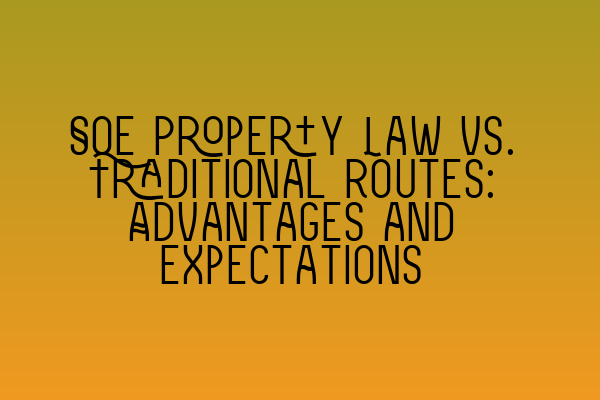SQE Property Law vs. Traditional Routes: Advantages and Expectations
Are you aspiring to become a property solicitor? If so, you may find yourself facing a decision between pursuing the traditional route to qualification or opting for the new Solicitors Qualifying Examination (SQE) route. Both paths have their advantages and expectations, and in this blog post, we’ll explore the differences, benefits, and considerations of SQE Property Law compared to the traditional routes.
SQE Property Law: What You Need to Know
The SQE is a new assessment framework introduced by the Solicitors Regulation Authority (SRA) to streamline the qualification process for solicitors in England and Wales. Under the SQE, aspiring solicitors must pass two stages of exams: SQE1 and SQE2, which assess their legal knowledge and practical skills respectively.
For many prospective property solicitors, the SQE route offers several advantages. Firstly, it provides a more flexible and accessible path to qualification. Unlike the traditional routes, which often require specific academic qualifications, the SQE allows individuals from diverse educational backgrounds to qualify as solicitors by demonstrating their competence through the exams.
Furthermore, the SQE allows candidates to gain valuable work experience through Qualifying Work Experience (QWE) placements, which can be completed before, during, or after the exams. This hands-on experience enhances their practical skills and gives them a real-world understanding of property law.
Expectations of the SQE Property Law Route
To succeed in the SQE Property Law route, aspiring solicitors must have a thorough understanding of the relevant legal principles, statutes, and case law. This includes having knowledge of property law concepts such as conveyancing, leases, mortgages, and landlord-tenant relationships.
To prepare for the SQE1 exams, candidates can take advantage of SQE 1 Preparation Courses, which provide comprehensive study materials and guidance to help them master the required legal knowledge. Additionally, practicing MCQs with SQE 1 Practice Exam Questions and taking practice mocks like FLK1 FLK2 can help candidates familiarize themselves with the exam format and assess their progress.
For the practical skills assessment (SQE2), aspiring property solicitors should focus on developing their ability to handle property-related legal matters. This includes drafting contracts, conducting legal research, advising clients on property transactions, and negotiation skills. SQE 2 Preparation Courses are available to help candidates develop these skills and gain the confidence needed to succeed in the exams.
Traditional Routes: A Tried and Tested Path
While the SQE Property Law route offers flexibility and accessibility, traditional routes to qualification should not be overlooked. The traditional routes typically involve completing a law degree or conversion course, followed by the Legal Practice Course (LPC), and completing a period of recognized training with a law firm.
The advantage of the traditional routes lies in their long-established reputation and recognition within the legal industry. Many law firms and employers still prefer candidates who have taken the traditional path, as they believe it ensures a deeper understanding and knowledge of the law.
Additionally, the traditional routes often provide structured academic and vocational training, giving candidates a comprehensive understanding of property law. This can be particularly beneficial for those who thrive in a structured learning environment or require the support and guidance offered by a law school.
Choosing the Right Path
Ultimately, the decision between the SQE Property Law route and the traditional routes depends on your individual circumstances and career aspirations. Considerations such as your educational background, availability of work experience opportunities, and personal learning preferences should guide your decision.
If you choose the SQE Property Law route, ensure that you have access to reliable study materials and resources, such as SQE 1 Preparation Courses, SQE 1 Practice Exam Questions, and SQE 2 Preparation Courses. These tools will help you build a solid foundation of legal knowledge and practical skills necessary for success in the SQE exams.
Remember, regardless of the path you choose, ongoing professional development and staying up-to-date with legal developments are key to a successful career as a property solicitor. So stay focused, motivated, and committed to your chosen route, and before you know it, you’ll be on your way to becoming a qualified property solicitor!
To find out more about the SQE exams, important dates, and additional preparation resources, visit SRA SQE Exam Dates. And to further enhance your preparation, check out the related articles below:
– SQE 1 Practice Exam Questions
– SQE 1 Practice Mocks FLK1 FLK2
– SQE 2 Preparation Courses
– SQE 1 Preparation Courses
